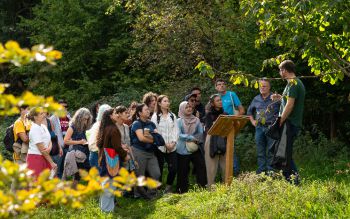View Experience Sussex! articles from previous issues and catch up on anything you’ve missed.
How you can help Sussex become the most biodiverse campus in the UK
Posted on behalf of: Student Communications
Last updated: Monday, 27 November 2023

We are lucky to be surrounded by the Sussex South Downs National Park and UNESCO biosphere. From a quick lunch break stroll, to a weekend hike across the downs, beautiful views and biodiverse landscapes are just a short walk away.
We also have a variety of biodiversity to explore right here on campus, including the woodland walk, dew pond, and low management wildflower-rich areas, however we are always looking to bring even more nature.
What we are doing for biodiversity
Our ambitious Biodiversity Strategy and Biodiversity Policy, published in 2021, sets out our vision of staff and students working together to become the most biodiverse campus in the UK. This includes our target of increasing campus land set aside for nature to 42% and involves implementing various staff and student-led biodiversity projects across campus.
Read on to hear about the different biodiversity projects going on at Sussex, and find out how you can get involved.
Love Your Scrub
Love Your Scrub is a rewilding project to expand scrub habitat on campus and increase biodiversity, with scrubland acting as a nursery for sapling trees and a haven for nesting birds, small mammals, beetles, moths and other invertebrates.
Increasing biodiversity is its main aim, but it is also seeking to promote an awareness of scrub as a habitat and how time spent within and around it can help human wellbeing too.
If this sounds exciting and you would like to take part, you can join the rewilding team as a volunteer. Love Your Scrub work with people from all disciplines, you just need to Love Your Scrub! Read more and find out how to get involved.
Orchard project
The orchard project aims to create a small scale orchard of six Sussex heritage apple trees, nestled behind IDS and the Library. Planting will begin in February 2024, and the orchard will develop over the years to come! They will ultimately provide free, fresh fruit for our community.
We’re looking for students to help us plant the trees at a Community Day on 07 February 2024, email sustainable@sussex.ac.uk to register your interest and find out more.
Psychology school garden
Planters containing a variety of drought-tolerant perennial flowers, offering food and habitat for pollinators and insects, as well as a ‘pocket allotment’ have been installed in the Pevensey I courtyard to enhance the space for students, staff, and nature.
With regular gardening sessions and integrated benches, not only do these planters facilitate nature positive action but they are also important for student wellbeing and help to raise awareness of the importance of the natural world and role of pollinators in food provision.
Pollinators
Students have worked alongside Dr Ellen Rotheray, one of Sussex’s resident bee and insect experts, on the installation of bee hotels and hoverfly lagoons.
Important natural habitat features, such as nesting sites for insects, are rare, declining or missing from urban landscapes. This project aims to increase the number of artificial pollinator habitats on campus to provide a steppingstone in time and give us an opportunity to study and monitor the inhabitants, which will inform management plans.
Bird boxes
Just look up! Through the installation of bird boxes, we are looking to create and maintain a population of declining bird and bat species right here at the University of Sussex. So far, we have placed blue tit boxes on oak trees across campus. These are to be monitored to assess their impact on local species.
How else you can get involved
Join Sussex’s biodiversity projects
If you have enjoyed reading about the work going on by staff and students across campus to help increase biodiversity and you would like to take part, then visit the biodiversity webpages to find out how you can get involved!
Student led societies
Take a look at the numerous student-led societies on the Sussex Students’ Union societies page, such as the Sussex Forest Food Garden, or Roots (Communal Gardening), to meet like-minded people who are passionate about biodiversity, nature and wildlife.
